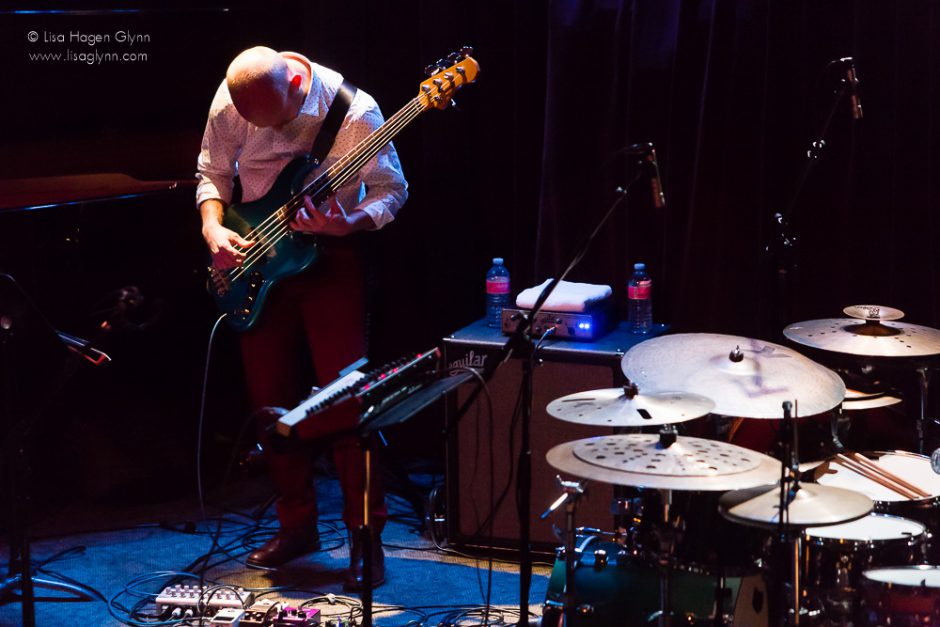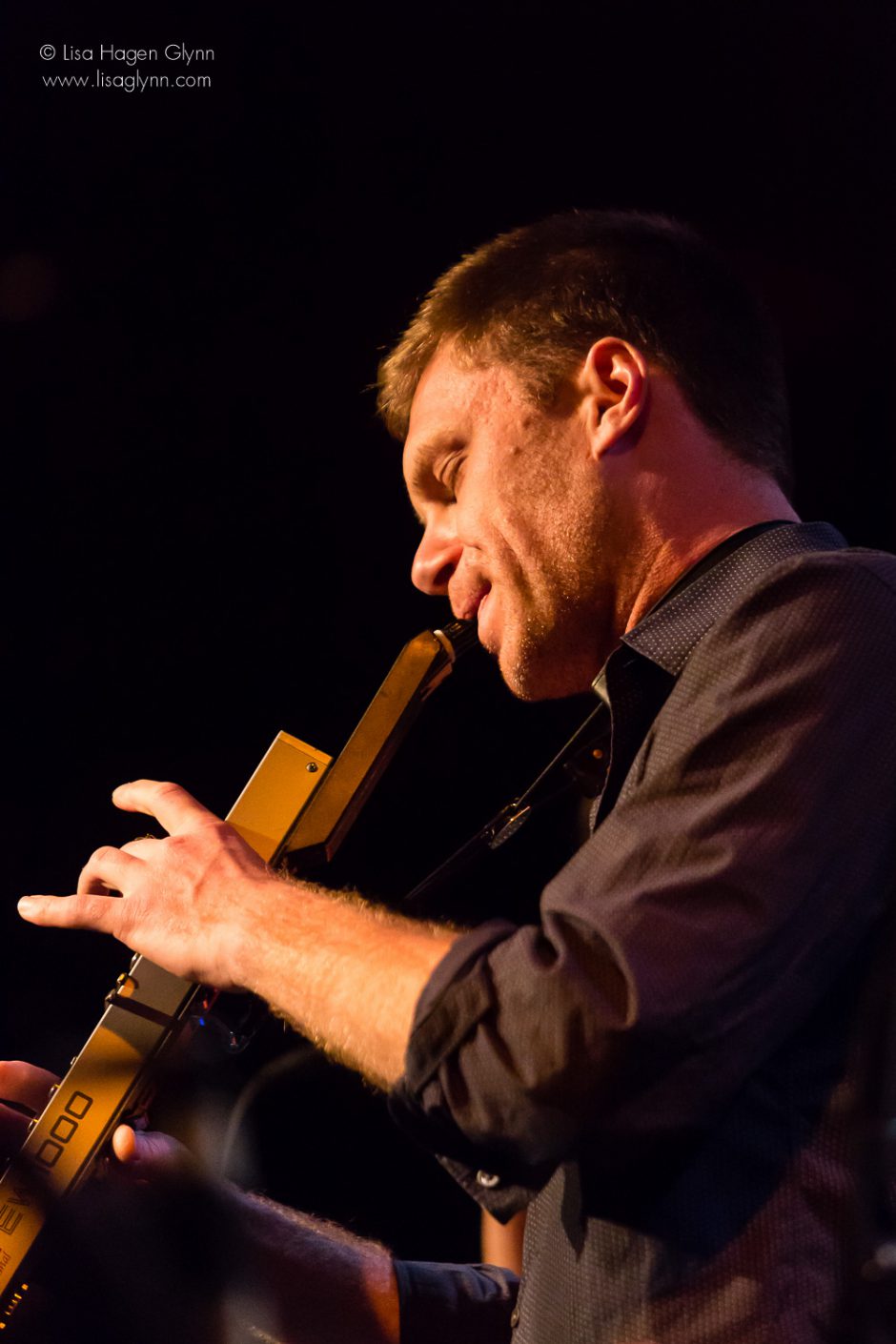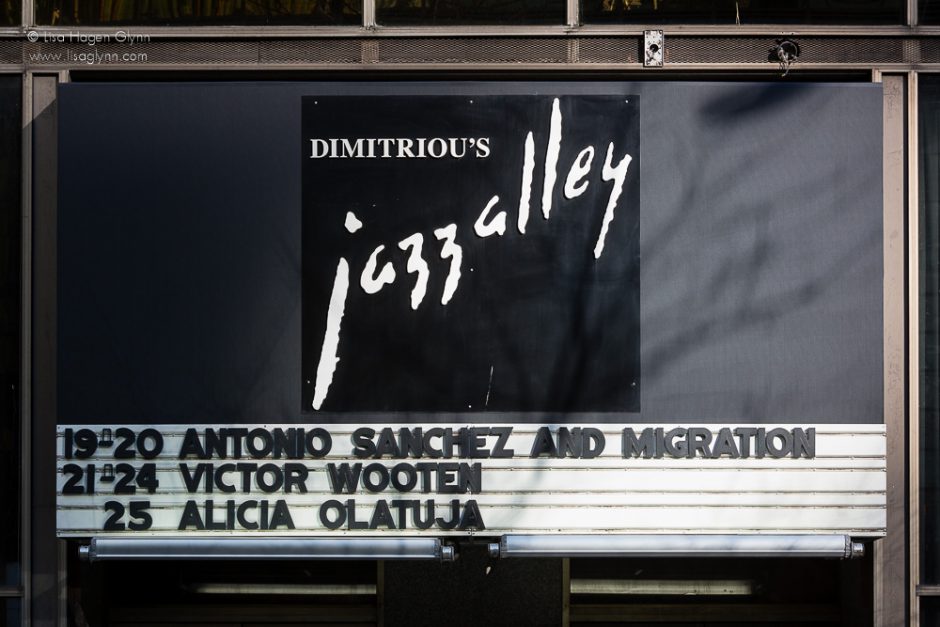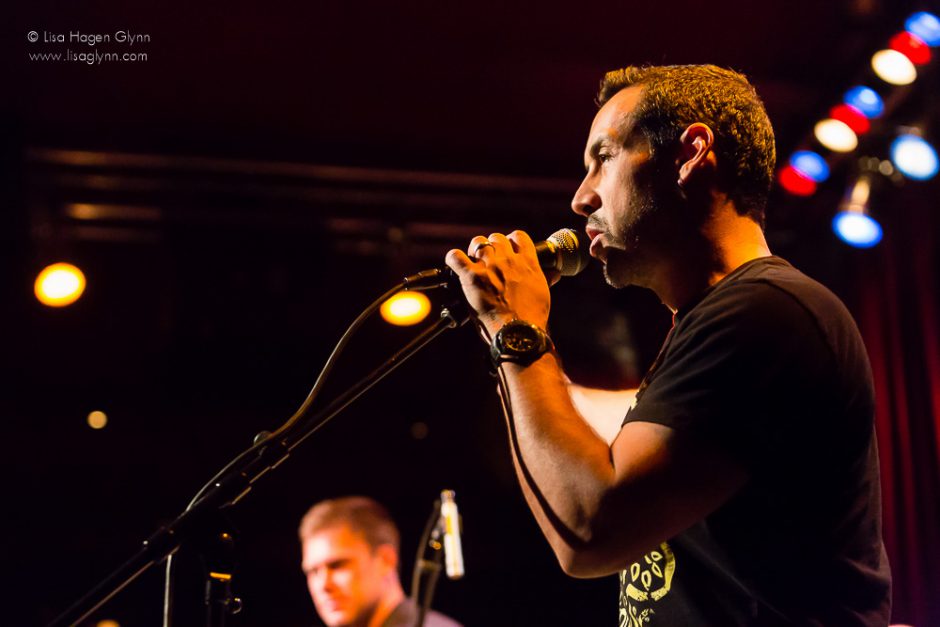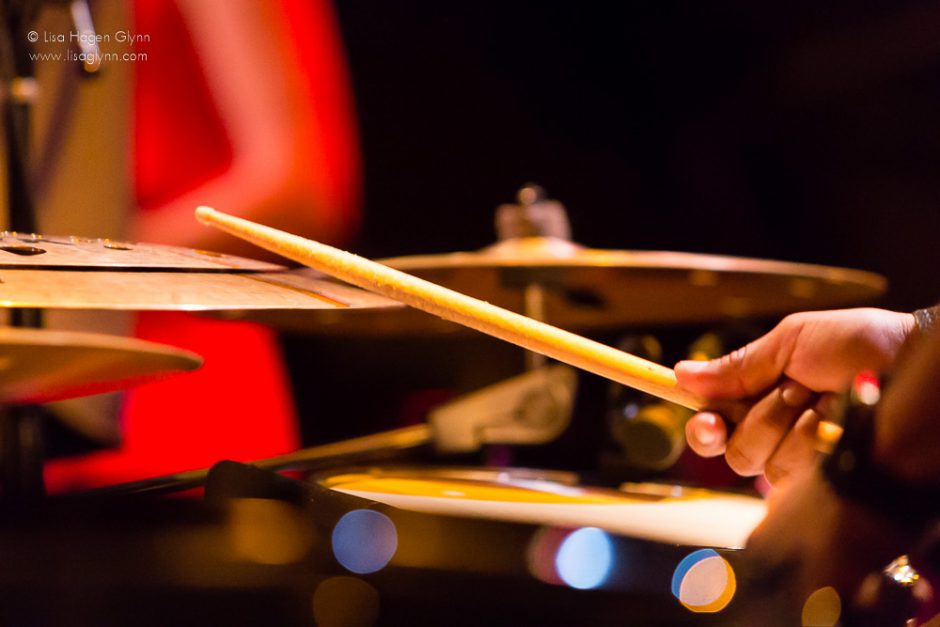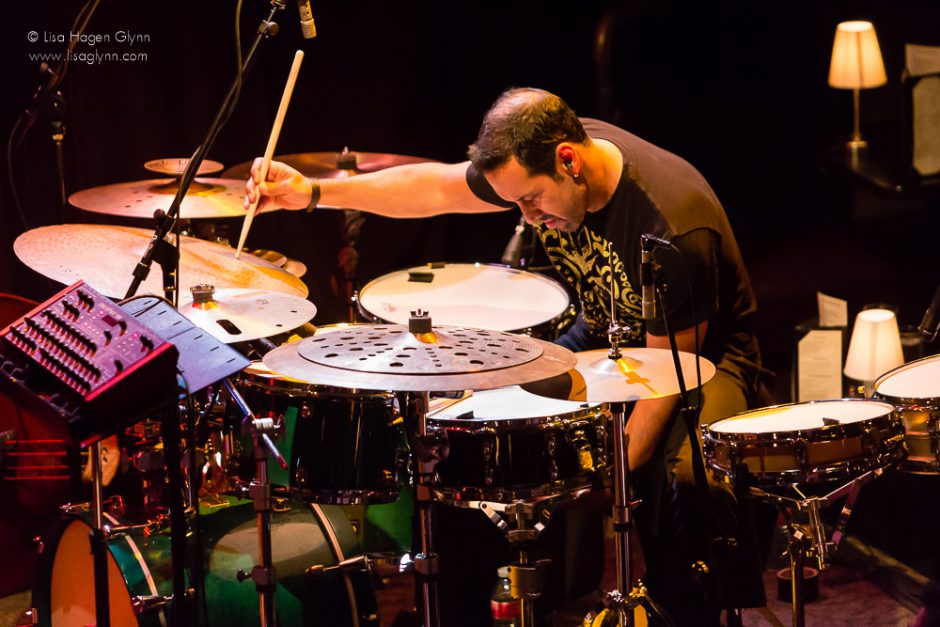Antonio Sánchez & Migration @ Jazz Alley, 3/19/19
Interview & Photos by Lisa Hagen Glynn
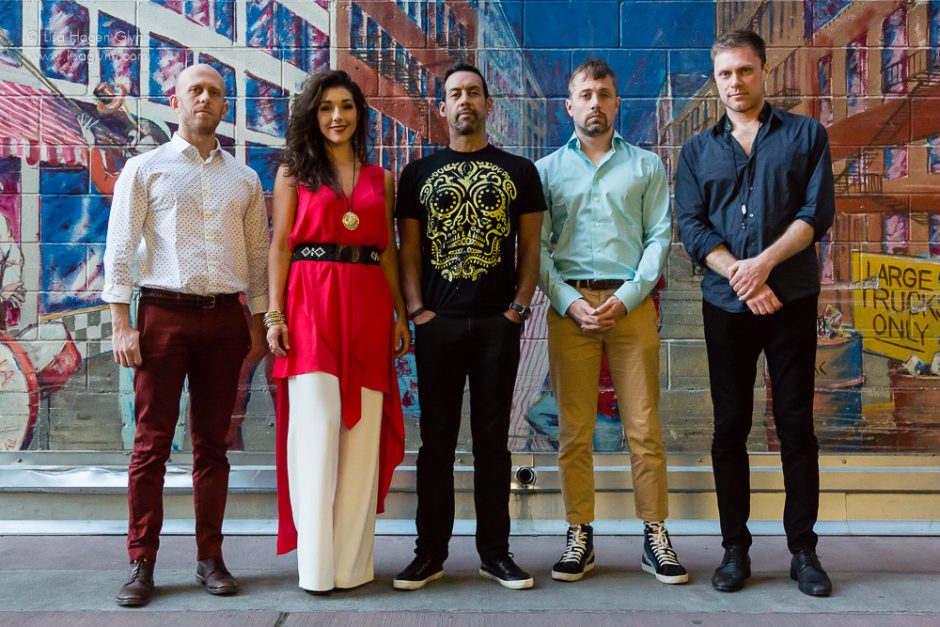
Antonio Sánchez and Migration are still sound-checking when I arrive at Jazz Alley. Sánchez sits at the drum set with impeccable posture, surrounded by no fewer than three snare drums and seven cymbal stands, all neatly aligned and illuminated by a gold spot. He wears a black sugar skull t-shirt, jeans, and a silver left earring. True to his style, Sánchez detonates a polyrhythmic burst atop a driving low groove, while barely bringing his hands above his waist.
Onstage to his right are vocalist Thana Alexa, keyboardist John Escreet, bassist Matt Brewer, and EWI–tenor saxophonist Chase Baird. Alexa requests more low tones from the mic and less piano in her wedge, while Escreet sits in the corner of a grand piano and a Rhodes Seventy Three. Brewer checks both acoustic and electric basses, and then takes five in a nearby booth. Baird discovers too much reverb on the sax mic, and pulls off “Careless Whisper” and a couple of smooth-jazz licks before the sound tech can intervene. The band sounds playfully innovative, and absolutely solid.
Sánchez greets me with a strong handshake and dark brown eyes that smile. We navigate to a small room crowded with a table, couch, and some emptied gig bags. Several knocks at the door remind me that free time on tour must be a luxury. “It’s always like this,” he explains. I thank him for fitting in an interview, and we sit down just before his first of two nights in Seattle.
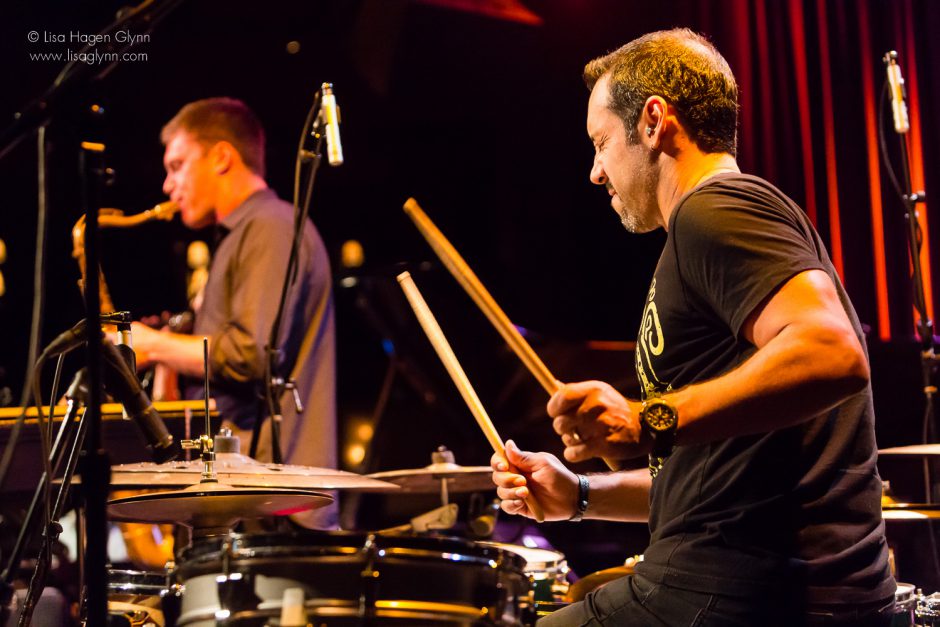
LHG for Back Beat Seattle: Tell me about Migration and how it might differ musically from your other projects. What do these musicians in particular bring to that concept?
Antonio Sánchez: [Migration] started as a saxophone trio—just saxophone, bass, and drums—and then two saxophones, bass, and drums, and then I decided I wanted to integrate piano. I studied classical piano in school and I write on piano, so it just made sense to me to include it. I think my ability to compose and to orchestrate has grown since my first [album]—it’s a completely different thing. This has become my flagship band to really express myself as well as I can, compositionally speaking. I’ve also been feeling for the last few years that no one situation really inspired me or challenged me or satisfied me enough—I really wanted to start writing music that included all the influences and musical tastes that I’m experiencing, from electronic music, to rock, to pop. What I like about Migration is that there are no rules—it could really be anything – so the malleability is what I’ve really liked the most in the last few years.
As you mentioned, you’re also trained as a classical pianist. How does this influence your composition and your approach to percussion?
Before I started composing, I was just playing the piano, although even at home I had a keyboard and I would always be doing my little pieces. The piano really informed my playing and opened my ears to harmony that I was not really aware of when I was just playing drums. Compositionally, of course, that’s where I can find the sounds that I’m looking for. Now, with technology and computers, you can make full-scale demos of a tune and really have a very clear idea of what it’s going to sound like at the end—to me, that’s incredibly valuable. And I make very detailed demos, so that when I get to the rehearsal or the studio or the concert, I’m very much aware of what it’s going to sound like, instead of being completely surprised by it: “Oh, I thought it was going to be way cooler.” [laughs]
Not the kind of surprise that you want.
Exactly.
You’re an outspoken critic of the President and his policies around migration. As a U.S. citizen with Mexican roots, what are your thoughts on his recent declaration of an emergency at the border?
I think it’s completely bogus. It’s obviously a last resort to get what he wants, because he’s a baby. Except he’s the President—so when he throws tantrums, there’s a lot of side effects and a lot of consequences. More than anything, I blame the Republican party, that they have stayed completely silent on the sidelines – that it’s the party of Reagan, and the party of decency and morality is all out the window. I think one good thing about all this is that the Democrats are coming out with really progressive ideas, which is very refreshing, because I don’t think centrist ideas are leading up to anything of meaningful change nowadays. From all the candidates, even though I liked Joe Biden with Obama, I don’t think he would be the right guy right now, because we need somebody that is going to push things completely the other way.
You have used the phrase “bad hombre” in both your recent albums—which of course the President has used to refer unfavorably to undocumented Mexican migrants. This seems like a reclamation of sorts, but what does that phrase mean to you?
Of course it came from the [President’s] infamous phrase, “We have some bad hombres here and we have to get them out.” But [the 2018 album] I did, called Bad Hombre, had a few different connotations. The first is because it was absolutely a solo project. Nobody else helped me in any way—I played all the instruments, I did the mixing, the production, everything —I did it at home. So it’s, you know, one hombre, right? [laughs] And then in jazz lingo, when you say something is bad, it means it is good. So Bad Hombre is a play on words. But definitely I’m reclaiming it for us in that sense—that bad means good, and that we’re just not going anywhere.


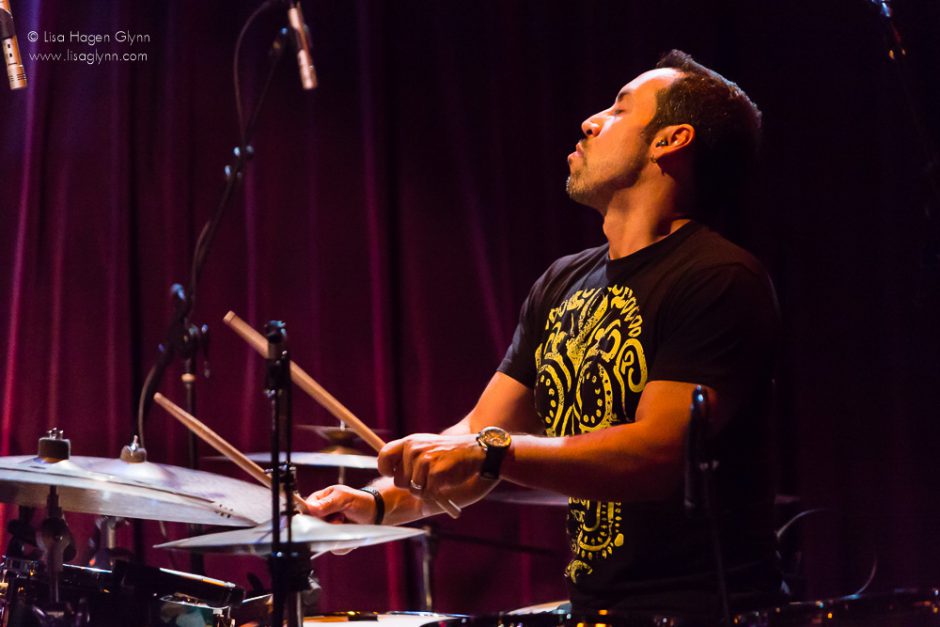

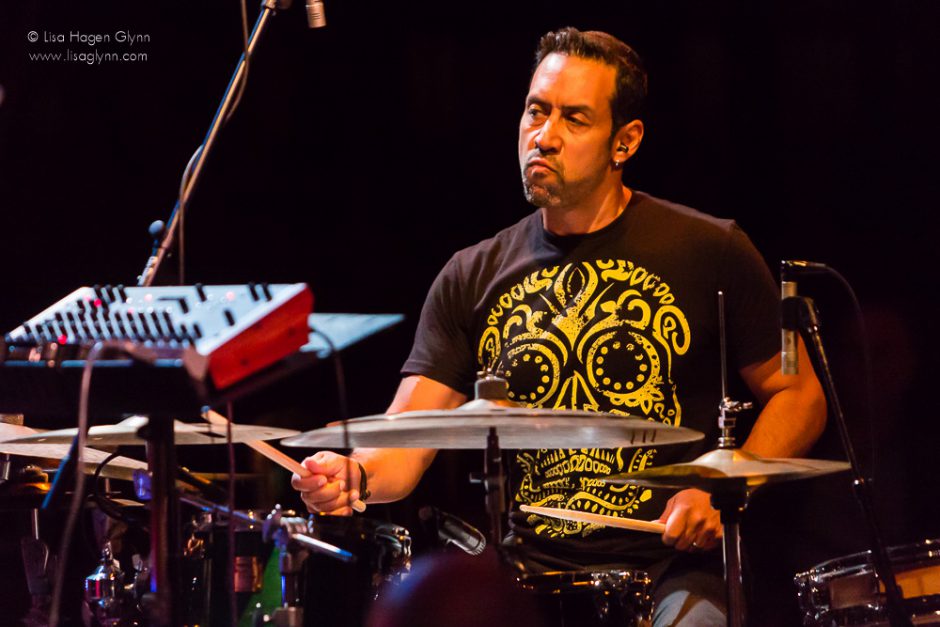
The opening track of Lines in the Sand, “Travesía” (“Crossing”), features actual audio from police and ICE raids—protestors, handcuffs clicking, and the screams of children being separated from their families. This is a startling and emotional opening track. Then the title track includes two poems and asks us to “¡Oye!” (“Listen!”). What is it that you want us to listen to, and what should we do as a result?
This album is really about the immigrant experience, but it’s not about people like me—because I’ve been incredibly lucky and blessed to be here, to be here legally, to do what I do. I never ran away from anything. This is more about the immigrant that is being constantly, especially lately, ostracized and demonized and politicized in the name of nationalism. It’s quickly eroding a very important sentiment of humans, which is to feel empathy for other human beings. So to me, “listen” is that—listen to these people who are usually in the shadows. We don’t see the problems that they are having because we don’t experience them. I got a taste of the immigration machine because I’m Mexican, and to keep renewing visas and work permits was incredibly annoying, hard, and degrading. And like I said, I’m one of the lucky ones. My family supported me, and I was able to show that we had enough money so that I was not going to want to stay in the States. As a musician, most of my friends maybe own a car, but they don’t own property, they don’t have big bank accounts, they live day by day a lot of times – and that’s a huge flag [for officials]. The whole thing is very disheartening, so what I’m trying for people to reflect on is how good most of us have it, and how difficult it is for a lot of people who are running away literally for their lives and their livelihoods and the well-being of themselves and their families. This album is not about hating on who is to remain unnamed—Individual #1, I like to call him—it is more about the opposite, about feeling love and empathy for the people who need it and deserve it. If we were running away from famine, from war, from violence, from persecution, how would we like to be treated?
For the migrants at the southern border – even those detained locally – what message do you want them to hear in your music? Even if they can’t hear your music, what can your activism to do for them?
I’d like to be more active, and sometimes I do outreach—especially with Latinos, because they obviously can relate to me. Latinos tell me, “It’s so cool to see one of us doing that, doing what you’re doing, and making it obvious that it’s possible and not completely out of the realm of reality for us. It can be achieved.” And of course I’m aware of how fortunate I’ve been- I’m one in a million or a billion—but I still want to tell especially students that might be discouraged about the current situation and the rhetoric that is being used, that we are actually able to be examples [ourselves]. We don’t always have to try to grab on the heels of other people—we can be the ones that people are going to look up to. That is what I want my message to be, and also that [migrants] are not alone, and that we’re thinking about them, and that we’re all trying to figure out how to deal with this.
You’ve worked with many of the modern jazz greats, including Pat Metheny; you’ve won a Grammy, a Golden Globe, a British Academy Film Award, and several other awards; and your current album is critically acclaimed. What’s next for you professionally?
Same thing but better, all the time! It’s a really hard career in general. It’s like going on an election cycle on every tour, and hopefully people will come and they will re-elect you and they will give you the stamp of approval. So that’s hard, and there are so many circumstances that affect all of that—the weather, the day of the week, just so many things. So for me it’s always nerve-wracking to go on tour, because I know the music’s good and the band is great, but I just don’t know sometimes if people are going to come or not. And now you have to be completely self-contained – you have to have your sound engineer, your booking agent, and honestly you need a publicist now —because record companies are doing very little to put the record out there, and clubs and venues are not doing that much to put the event out there either. But I’m still incredibly lucky to be doing this, and for promoters to book me. I still think of myself as this kid from Mexico that’s just trying to play the drums, and I’m elated every time somebody lets me [share] my music. I know it’s good, and I really strive for quality. But because I am Mexican and I have a very Mexican name and I’m playing jazz, I feel like I have to really prove myself, more than if I had an American name and I was Black or White. So that’s always part of the equation, but I feel like that also pushes me to try harder and to be better.
I’ve seen you play twice before now—at the Neptune Theatre last year for Birdman, which was amazing…
…Thank you. That was a good gig.
Yes, it was great! —And then then at the Jazz Standard [in New York City] with Matt Brewer, Donny McCaslin, and…
…Chris [Potter]. Oh, cool! So you haven’t seen this band [Migration]. I’m looking forward to seeing what you think. We’re only five people, but we sound really big because everybody has different electronics that they’re playing with. But we also get really acoustic at the same time, so I think it’s a nice combination.
Definitely. The EWI, and the vocals…
Yeah. Yes, the vocals, Thana [Alexa] has so many things going on, and Matt [Brewer] also has tons of pedals. I’m the only lame one who doesn’t have a bunch of electronics, but that will change probably. But it’s just too much to carry, man. [laughs]
It’s a lot of gear.
It’s a lot of gear.
Thank you. Such a pleasure.
A preview of the Seattle shows appears on Back Beat Seattle. Antonio Sánchez and Migration continue their tour through early April, with stops in the Pacific Northwest, Southwest, and East Coast.

